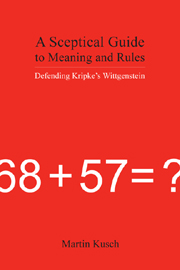Book contents
6 - Intersubjectivity and assertability conditions
Summary
Introduction
According to traditional scholarship, §§243–315 of PI constitute Wittgenstein's “private language argument”. Kripke challenges this view by insisting that “the real ‘private language argument’ is to be found in the sections preceding §243”. These are the sections dedicated to rule-following (PI: §§138–242). Concerning §§243–315, Kripke holds that they are but an application of the general considerations concerning rule-following to the special problem of sensations (WRPL: 3). Kripke also proposes a reformulation of what the “real” private language argument establishes:
What is really denied is what might be called the ‘private model’ of rule following, that the notion of a person following a given rule is to be analysed simply in terms of facts about the rule follower and the rule follower alone, without reference to his membership in a wider community.
(WRPL: 109)In this chapter I shall discuss various issues relating to the private language argument as WRPL presents it. I shall begin by distinguishing between two ways – the “official road” and the “improved road” – of arguing for intersubjectivity and against privacy. The official road seems to be favoured by Kripke himself. It defends a communal analysis of meaning and rule-following in three steps. The first step establishes that meaning determinism is unsatisfactory. The second step focuses on replacing classical realism with assertability (that is, on replacing explanatory truth-conditions with assertability conditions). And the third step shows that, properly understood, assertability conditions – indeed, the assertability conditions we actually have – rule out the private model of rule-following.
Information
- Type
- Chapter
- Information
- A Sceptical Guide to Meaning and RulesDefending Kripke's Wittgenstein, pp. 177 - 206Publisher: Acumen PublishingPrint publication year: 2006
